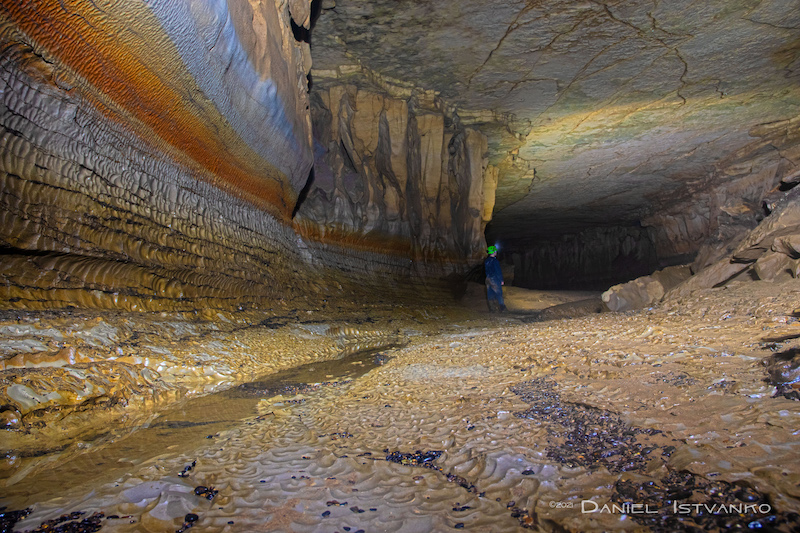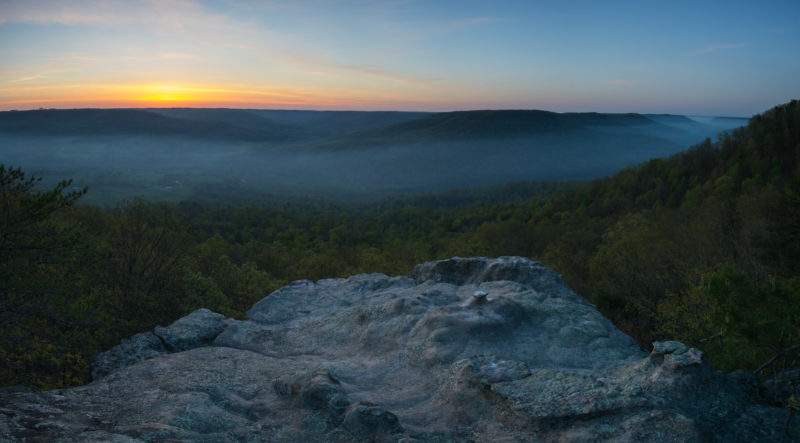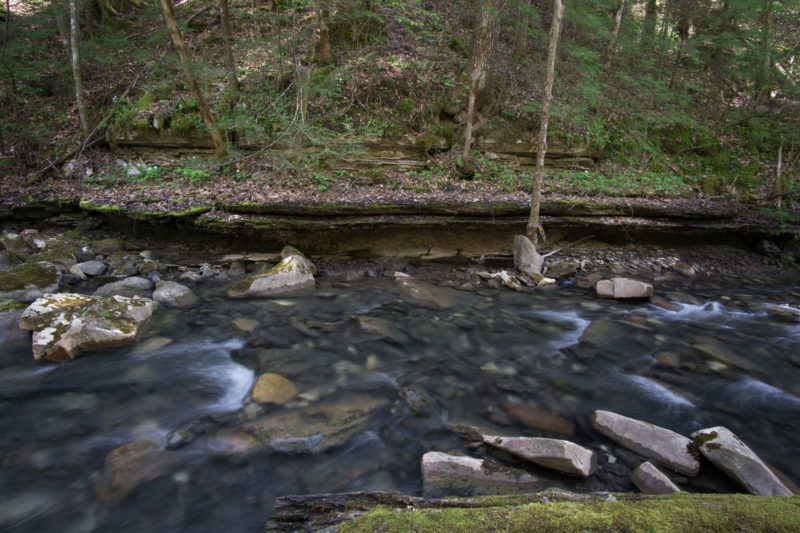
Conservation easement on private forest opens new lands for recreation, protects vulnerable wildlife habitat and supports local timber jobs
FENTRESS AND OVERTON COUNTIES —The Conservation Fund, the Tennessee Department of Agriculture Division of Forestry and the Tennessee Wildlife Resources Agency have announced the protection of 11,723 acres of ecologically important forestland, completing a multi-year effort to conserve more than 14,700 acres in the Cumberland Plateau. Located adjacent to the state’s Skinner Mountain Wildlife Management Area (WMA), the newly conserved property will remain privately owned and sustainably managed for timber production while preserving biodiverse habitat and allowing public access for hunting, hiking and other recreational activities.
A priority for conservation because of its ecological and economic importance, this dramatic landscape of gorges, cliffs and waterfalls near the East Fork Obey River provides significant habitat for a variety of endangered and threatened species of mussels, migratory songbirds and plants. More than 50 caves are now fully conserved as part of this conservation effort, including the fifth longest cave in the state. These caves provide critical winter habitat for the most endangered mammal in the state—the Indiana bat—and six additional species of concern.

The Conservation Fund—a nonprofit organization dedicated to providing conservation solutions that deliver both economic and environmental benefits—purchased 14,770 acres, including this property, in 2017 through its Working Forest Fund® as an initial step to protect it from development and conversion to non-forest uses. The Tennessee Wildlife Resources Agency acquired 3,041 acres in 2019 and added them to Skinner Mountain WMA. This week, the remaining 11,723 acres have been permanently protected with conservation easements, which limit development, provide public access as part of Skinner Mountain WMA and permit sustainable timber harvesting under private ownership.
“This project completes a three-phase effort to conserve wildlife and expand public access for outdoor recreation,’ said State Forester David Arnold. “Protecting environmentally important, working private forestlands threatened with conversion to non-forest uses while enhancing forest benefits such as wildlife habitat, clean water and timber products through active forest management demonstrates a commitment to conservation by all involved.”
“Being able to conserve and protect the number of aquatic and terrestrial species that exist in this area is a big deal in itself,” said Bobby Wilson, TWRA Executive Director. “But being able to allow the continued harvest of timber as well as allowing access to hunters, fishermen and wildlife watchers makes it even more special.
The significance of this conservation effort was nationally recognized when it was ranked third in Fiscal Year 2019 by the U.S. Forest Service and awarded $5.6 million from the Forest Legacy Program through the federal Land and Water Conservation Fund (LWCF) enabling, in part, the state’s purchase of the conservation easements.
“The Forest Service is pleased to collaborate with state and nonprofit partners to deliver the Forest Legacy Program in Tennessee and conserve places like Skinner Mountain WMA for future generations to enjoy. The process of applying for, being selected, receiving funding and conducting due diligence can take several years and requires a high degree of commitment from partners and landowners. We applaud the amount of work that goes into making this happen,” said Ken Arney, Regional Forester.
“Conservation works best when it provides positive outcomes for both nature and communities. Here in the Cumberland Plateau, working together with the state, we were able to strike a successful balance between securing ecologically sensitive forestland and continued private management that supports the state’s timber industry, more than 100 jobs and the local economy,” said Ralph Knoll, The Conservation Fund’s Tennessee State Director. “We are grateful to our partners at the U.S. Forest Service and funding from the LWCF that have once again helped protect a critical working forest landscape so it can continue to provide important climate, economic and ecological benefits.”
Tennessee’s U.S. Congressional delegation representing Fentress and Overton counties—U.S. Senator Marsha Blackburn, U.S. Senator Bill Hagerty and U.S. Representative John W. Rose—supported the use of federal LWCF funding for this project.

Additional support for the completion of this conservation effort at Skinner Mountain was provided by the Richard King Mellon Foundation; the National Fish and Wildlife Foundation (NFWF) through both Walmart’s Acres for America Program and through the Cumberland Plateau Stewardship Fund, with funding from International Paper’s Forestland Stewards Partnership and Altria Group; the Community Foundation of Middle Tennessee; and U-Haul. The Tennessee chapter of The Nature Conservancy will annually monitor the property to ensure the terms of the easements are met.
“Skinner Mountain represents some of the most important wildlife habitat in Tennessee for a significant number of species, in addition to including important forestlands that support local jobs and communities,” said Jeff Trandahl, Executive Director and CEO of NFWF. “The National Fish and Wildlife Foundation is proud that two of our partnerships were able to support this amazing project, and we know that Skinner Mountain will be treasured by future generations of visitors.”
“U-Haul Company proudly partners with The Conservation Fund to create lasting, positive environmental impacts in communities across America such as this one at Skinner Mountain,” said John ‘JT’ Taylor, President, U-Haul International. “Since 2007, U-Haul and more than 2.5 million customers have generously donated to The Fund, demonstrating shared values in protecting our forests and preserving our environment for future generations. U-Haul is grateful for our customers’ continued support and to The Fund for their exceptional ongoing stewardship of those donations in the communities where we live, work and play.
“Working forests are often the lifeblood of local economies supporting jobs and local mills, while sustaining vulnerable wildlife and giving us opportunities to experience the natural beauty of places like the Cumberland Plateau,” added Knoll. “We’re grateful for the Richard King Mellon Foundation, which provided a generous loan to enable our initial purchase of Skinner Mountain Forest and a grant to implement the conservation easements. The foundation continues to be a national leader and advocate for the protection of environmentally sensitive areas through the financing of land acquisition.”
About The Conservation Fund
At The Conservation Fund, we make conservation work for America. By creating solutions that make environmental and economic sense, we are redefining conservation to demonstrate its essential role in our future prosperity. Top-ranked for efficiency and effectiveness, we have worked in all 50 states since 1985 to protect more than 8.5 million acres of land, including more than 327,000 acres in Tennessee. Through our Working Forest Fund®, we aim to permanently conserve five million acres of at-risk working forests to mitigate climate change, strengthen rural economies and protect natural ecosystems. www.conservationfund.org
About the Tennessee Division of Forestry
TDF protects Tennessee’s forests by fighting wildfires, coordinating hazard emergency response, providing prescribed fire guidance and contract services, as well as wildland fire training. Additionally, the Division promotes the responsible use of forest resources by assisting landowners, providing quality seedlings, monitoring insects and diseases, improving urban forests, managing state forests, protecting water quality and collecting forest inventory data. The Division also works to promote primary and secondary forest industries to stimulate the state’s economy. Visit www.tn.gov/agriculture/forests for more information.








